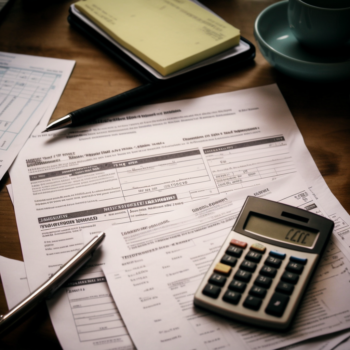Valuation for Tax Purposes — Definition

Valuation for tax purposes is the process of determining the value of an asset or property for the purpose of calculating taxes or other related financial obligations. The process involves assessing the market value of the asset or property, as well as potential liabilities associated with it, such as taxes, fees, or other costs. The valuation is typically conducted by a qualified professional or a governmental body, such as a tax authority.
Valuation for Tax Purposes — Why
The process of valuation is important because it can help businesses, individuals, and organizations determine the proper value of an asset when filing taxes. This is important because if an asset is not properly valued, it could lead to over- or underpayment of taxes. Additionally, valuation for tax purposes can help people, businesses, and organizations understand how their assets can be used to reduce their tax liabilities.
Valuation for Tax Purposes — 9 Key Factors to Consider
The valuation process can be complex and subjective. Why? Because there are several factors that need to be considered to ensure an accurate and fair valuation. And a qualified appraiser is one who can achieve this. They provide a complete and accurate narrative report that explains the process and results of the valuation. Let’s try and understand which 9 factors need to be considered when opting for valuation for the purpose of taxation.
1. Purpose of Valuation:
The first factor to consider is the purpose of the valuation. Taxation can involve different types of taxes, such as income tax, property tax, and capital gains tax. Each tax may have different valuation methods and criteria. Therefore, it is essential to determine the purpose of the valuation before choosing a valuation method.
2. Market Conditions:
What the market conditions are at the time of valuation can have a significant impact on the value of an asset or property. For example, if the market is experiencing a recession, the value of a property may be lower than what it was at the time of a booming economy. Similarly, the value of a stock may be higher or lower depending on the market conditions prevailing at that time.
3. Type of Asset:
At the time of valuation what type of asset is being evaluated becomes an important factor to consider. Assets can be tangible, such as real estate or machinery. They can be intangible, such as intellectual property or goodwill. The valuation method may vary depending on the type of asset. Also, different valuation methods may need to be used to arrive at the final result.
4. Asset Life Cycle:
The life cycle of an asset is also crucial when determining its value. When an asset is new its value may be higher than an older asset. This value may also decrease as the asset gets closer to the end of its useful life. Therefore, it is essential to consider the asset’s age, condition, and how much longer it will last when determining its value.
5. Asset Characteristics:
The characteristics of an asset can also impact its value. For example, a property located in a prime location may have a higher value than a property in a less desirable location. Similarly, a company with a strong brand may have a higher value than a company without a well-known brand.
6. Valuation Method:
There are different valuation methods that can be used to assess the worth of an asset. Some of these methods include the income approach, market approach, or cost approach. Each method has its unique strengths and weaknesses. That is why the best method will depend on the type of asset and the purpose of the valuation.
7. Documentation:
It’s important to keep detailed documentation of the valuation process. This includes the valuation method used, the qualifications of the appraiser, and any relevant market data. This documentation can be useful in case of any future disputes or challenges to the valuation.
8. Review and Update:
It’s also important to periodically review and update the valuation of assets. This is particularly true in cases where the market conditions or other factors may have changed significantly. This can help ensure that the valuation remains accurate and up-to-date and can help avoid any potential tax issues.
9. Appraiser Qualifications:

Finally, it is essential to consider the qualifications of the appraiser conducting the valuation. The appraiser should be experienced and knowledgeable about the several valuation methods being used. They should also have no conflicts of interest that may influence the valuation.
By keeping in mind, the above factors and seeking the guidance of qualified professionals, it will help ensure that your assets are accurately and fairly valued. This in turn can help minimize your tax liability and avoid any potential legal issues. To know more, get in touch with experts from Appraisily.
Cited Sources
https://www.alvarezandmarsal.com/insights/understanding-nuances-valuations-tax-purposes
https://www.kemptoncarr.co.uk/services/valuations-for-tax-purposes/





